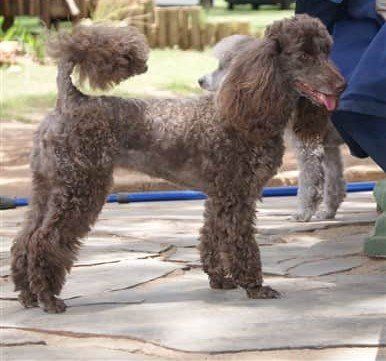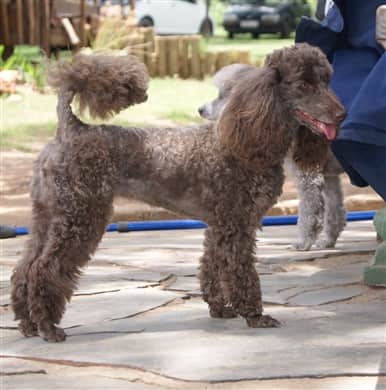Poodle Dry Skin
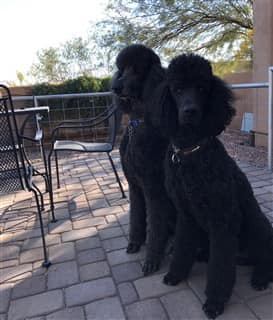
Overview
It is not uncommon for Poodles to have dry skin. This sort of issue is common with dogs in general, and even more so with breeds like the Poodle that have hair as opposed to fur.
Dry skin may come and go with the seasons, or be a chronic issue. It may be limited to just certain areas such as the paws, nose, elbows, or tail, or be an all-over body problem.
Since dry skin on a Poodle can be quite uncomfortable for the puppy or dog, and can quickly spiral into other, more serious conditions including cracking which leaves the area vulnerable to infection, it is important to take steps to restore the skin to a healthy state.
This page will cover the top 7 reasons why a Poodle may have dry skin, and exact steps you can take to remedy this.
Please note:
AllPoodleInfo is reader-supported, and some of the product suggestions on this page are affiliate links. As an Amazon Associate we earn from qualifying purchases. This is at no extra cost to you and helps us continue providing free, high-quality information.
Already know all about this issue, and just want something to help cure your Poodle’s dry skin?
Jump right to: Recommended Products to Heal Dry Skin
The Keys to Fixing Dry Skin on a Poodle
There are two parts to resolving dry skin issues; one is to decrease or eliminate the underlying trigger. The other is to use certain moisturizing products to heal and renew the skin.
If you do just one of these steps, you’ll find that you’ll have only temporary or limited success.
In addition, many Poodles will have issues due to more than one cause. For example, a food additive intolerance and resting on improper surfaces. Eliminating one, but not the other, will also prevent you from being able to clear up the problem.
Finally, each reason for dry skin may have several treatment steps. For example, making multiple changes in the environment, using a spray, and switching to a better, specialized shampoo. If you skip over one of the steps, you’ll find limited or temporary success.
Now, let’s dive into the top 7 reasons for dry skin with Poodles.
Reason #1 Allergies
What you should know:
Allergies with canines can be placed into 3 categories: Food, environmental, and contact.
The #1 type of allergy that causes dry skin on the body is a food allergy (or intolerance). This is most often due to additives in dog food including chemical preservatives, artificial coloring and/or flavoring. High grain content, soy, corn, and other cheap fillers can cause problems as well. Though it is much rarer, some dogs can have a reaction to a certain protein, even poultry which is normally tolerated very well.
The #1 type of allergy that causes dry skin on the nose is contact allergies. This refers to any type of material that a dog comes into contact with. Dry noses are often linked to eating or drinking out of plastic bowls. Other types of contact triggers include certain fabrics such as carpeting, a dog’s bed cover, etc.
Environmental allergies are often due to seasonal pollen or weeds, though this can also include indoor triggers such as dust mites or residue from cleaning products. With this, there is typically other symptoms including breathing issues.
Other signs:
With all types, during initial onset or with limited exposure to the trigger the only sign may be dry skin.
Without changes being made or with long-term exposure, there are often more symptoms including but not limited to rash, itchiness, hot spots, breathing issues, and/or red or teary eyes.
What to do:
1. Reassess your Poodle main food and all snacks.
Both should be 100% all-natural, with zero chemical preservatives and artificial coloring or flavoring. Look for a grain-free formula with no corn or soy.
If you suspect an intolerance to poultry (the most common base in kibble), consider a switch to a lamb, fish, or beef formula.
For kibble, we highly recommend Wellness CORE for all Poodle varieties (see below). This superior food has a small breed formula for toy and miniature Poodles, and a regular formula for standard Poodles.
If you are looking for a poultry alternative, Merricks is a great choice (see below). This is a top-quality brand, meets all guidelines for a purely wholesome food, and offers lamb, beef, and fish bases. Note that their 'Lil Bites' variety is best suited for toy Poodles and miniatures on the smaller end; their regular variety is ideal for minis on the larger end and for standards.
For treats, there are some great choices including the line of Zuke’s All Naturals and Wellness Bites, both of which have many different flavors.
And next, we'll cover other steps to resolve reactions.
2. Keep the house free of allergens. Wet-dust often, wash bedding and other washables with a hypo-allergenic laundry detergent, and vacuum with a HEPA certified vacuum cleaner. Run your central air’s fan while using a HEPA filter or set up free-standing air purifiers.
Have everyone remove shoes before entering the house, and any time that your Poodle comes inside after being out, swipe down the coat with a grooming wipe like Earthbath All Natural Grooming Wipes
 and rinse off the paws.
and rinse off the paws.
3. Look for possible contact triggers.
Do not use any sort of plastic bowls, even those that are BPA free. Stainless steel is best, and ceramic (though these can break much more easily) will work as well.
Just a reminder that since Poodles are prone to bloat, you’ll want the bowls to be floor level, not raised. One like KEKS Set of 2 Stainless Steel Bowls with Non-Skid Mat
 is a great choice for toy Poodles, and for standard Poodles one like the URPOWER Stainless Steel Dog Bowl Set with No Spill Non-Skid Mat
is a great choice for toy Poodles, and for standard Poodles one like the URPOWER Stainless Steel Dog Bowl Set with No Spill Non-Skid Mat
 is a great choice. If your Poodle eats very fast, another trigger for bloat, place a stainless steel portion pacer in the bowl.
is a great choice. If your Poodle eats very fast, another trigger for bloat, place a stainless steel portion pacer in the bowl.
If you suspect that carpeting is the problem, encourage your Poodle to rest and sleep in his/her bed or place down blankets that have been washed with hypo-allergenic detergent.
4. Use restorative treatments.
Shampoos, leave-ins, lotions, and balms can all restore dry skin back to health. Read more about leading causes of dry skin or jump to: Recommended Products to Heal Dry Skin.
5. Seek veterinary care.
Your Poodle’s vet can help diagnose the triggers via blood testing (ELISA) or intradermal skin testing, and prescribe medications that can help including antihistamines and anti-inflammatories.
Reason # 2: The Weather
Rococo (forefront, 4 and 1/2 years old) and Oliver (back, 9 years old), photo courtesy of Alexandra Hyde-Clarke
What you should know:
Breeds like the Poodle that have hair as opposed to fur are much more prone to weather related dry skin.
In the winter, the air is typically very arid due to low humidity levels, and this goes for air both outside and inside the house. When outdoors on walks, cold temps and chilly winds add to the drying effect.
In the summer, hot sunshine can have a constant, wearing effect on a dog, eventually leading to dryness.
Other signs:
Dry skin may be the only sign, however since skin and coat go hand-in-hand, a Poodle’s hair may also start to dry out, becoming brittle or otherwise have poor texture.
Paws can also dry out quite badly due to the elements. There may be peeling on the paw pads, and issues with the skin between the toes.
The nose may become very dry, and left untreated it can begin to crack. Cracking may lead to infection, with pus-like discharge and/or bleeding being warnings signs of this.
What to do:
1. In the winter:
- Work to add moisture to the house.
Humidifiers are the best method for this. If you only have one, set this up where your Poodle normally rests and sleeps. Other alternatives that work to some degree include having lots of house plants, leaving the door open when taking a shower, and leaving bowls of water out (often placed over heating elements).
- Protect your Poodle’s coat with a good leave-in product (see below).
This will add a layer of protection for both skin and coat. You’ll want to spritz this on about every 3 to 4 days. You can spritz and scrunch with your hands, or spritz and comb.
- Protect your Poodle’s paws with a quality paw wax (see below).
This will help prevent the paws from drying out due to cold walking surfaces and possible contact with ice melt chemicals. A good one will add a layer of protection but allow the paws to breathe. This is normally applied once a week. Be sure to massage this into the pads, between the pads, and around the toes.
- Protect your Poodle’s nose with a quality nose balm (see below).
The nose is such a vulnerable body part. And since a dry nose often causes a dog to lick it, it can easily become chapped as well. A good nose balm will soothe and heal dryness or cracking, and prevent issues from reoccurring.
To fix drying issues, apply a nose balm 2 to 3 times per day, with one of the applications being at night, right as your Poodle is falling asleep or soon afterward. When using as prevention, apply once every 1 to 3 days depending on the weather.
2. In the summer:
- Protect your Poodle from sun exposure and/or burns.
The sun is a top culprit for dry skin. While a leave-in spray will work to some degree to block the sun's rays, you may wish to use one that contains a sunscreen or to use a canine sunblock product. Sunblock is the best choice for Poodles that are shaved rather closely and/or those that spend a lot of time outside in the summer (see below).
- Protect the paws from hot walking surfaces.
The main problem is the paws coming into contact with walking surfaces ranging from very warm to shockingly hot. A temperature of 120 F will cause a dog discomfort. Any temp over 125 F will cause damage. Pavement, concrete, and brick can easily reach 140 F on hot summer days.
Paws can also dry out due to tiny nicks and scrapes from small, sharp pebbles that irritate the skin.
A good paw wax, applied about once a week, will serve as a barrier to help guard against heat and repel tiny debris (see below).
- Protect your Poodle’s nose with a quality nose balm (see below).
While some sun is actually good for a dog’s nose (it helps it keep its pigmentation) too much can be very damaging. Even a minor sunburn (typically with strong, direct exposure 20+ minutes) on the nose can lead to drying and peeling. If this is not properly treated, it can quickly spiral into cracking.
So, during the summer months, find a good balance between letting the nose get some sunshine and protecting it when your Poodle will be outside for an extended period of time.
At the very first signs of drying, immediately start using the balm to stop more serious issues from developing.
- Work to keep your Poodle hydrated. While meeting water requirements is important year-round, it is during the summer that canines are most vulnerable to becoming dehydrated. More details are ahead.
Reason #3: Improper Resting Surfaces
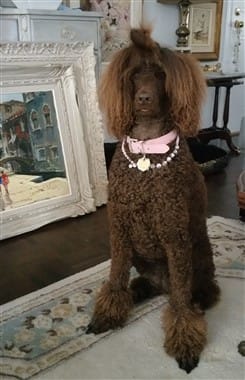
What you should know:
If a Poodle rests or sleeps on hard or irritating surfaces, this can be very wearing on the body, and in particular parts of the body that are pressure points like the elbows. These pressure points can eventually show that wear with poor coat texture or even thinning hair, and the skin can become very dry or even develop sores.
What to do:
1. Be sure that your Poodle has appropriate resting and sleeping surfaces. Just because dogs like to lie on the floor, does not meant that it is good for them. Not only can it cause issues like dry skin, but since the floor does not offer proper support, this can contribute to hip, back, and knee issues.
This is particularly relevant for Poodles that have had bone or ligament conditions in the past, and for older Poodles nearing their senior years
since arthritis is a major concern.
All varieties of Poodles of all ages should have memory foam (orthopedic) beds or mattresses. Dogs that like to cuddle up often do best with bolstered beds. Those that love being low may prefer a flat mattress.
2. Use a healing cream on raw and/or dry elbows.
Reason #4: Inadequate Water Levels
What you should know:
In general, canines need anywhere from 8.5 to 17 ounces of water per day for each 10 pounds of body weight. This amount varies quite a bit depending on a dog’s age, health status, activity level, how much water is in a dog’s food, and the environmental temperature.
It’s really easy for a Poodle to become dehydrated. Puppies may be too busy playing and then napping to break away to drink, and adults may not properly self-regulate.
Just a 3% drop from normal water levels can cause minor dehydration. This can result in a number of symptoms, including trouble concentrating and irritability.
And water has a huge effect on the skin. Just a day without proper levels can start to dry out skin, and an ongoing water deficiency can result in very poor skin health. It’ll be more sensitive to outside elements, may lose its natural elasticity, and can become so dry that it cracks.
What to do:
1. Keep the bowl filled with cool, fresh water.
Do not top it off, but rather pour out old water, clean the bowl, and refill with new water.
2. Give thought to the type of water you give to your Poodle. Clean water is more drinkable water, and the tap water in most of the US is filled with toxins. Shockingly, many are known and allowed. This includes traces of pesticides, arsenic, fuel runoff, and a host of other pollutants. There are potential cancer-causing agents as well; most notably chromium-6 is in the drinking water of over 200 million Americans in every state of the country. If this name sounds familiar, it is the controversial contaminant that the movie Erin Brockovich is centered on.
To ensure that your Poodle’s drinking water is safe, you can offer bottle spring water, connect a filtering device to your kitchen sink, or use a portable filtering water pitcher like the Aquagear Water Filter Pitcher , which removes a wide array of toxins including chromium-6.
, which removes a wide array of toxins including chromium-6.
3. Bring along water whenever you take your Poodle out for a walk.
Stop at the halfway point to offer a break and a drink.
4. Add water-rich foods to your Poodle’s meals.
Blueberries (86% water) and raspberries (87% water) are great low-calorie choices that are packed with antioxidants.
Reason #5: Bathing Techniques
What you should know:
1. The timing of baths is important.
Not enough can lead to a buildup of body oils that can clog skin pores; this can cause pimples and/or lead to quite terrible smells. But too many baths, even when using superior bathing products, can lead to dry skin.
The reason for this has to do with how a dog’s natural body oil build ups and is cleansed away.
A minute amount is near constantly secreted through skin pores. It serves as a natural lubricant for the skin. When you give your Poodle a bath, assuming that the shampoo is doing its job, those oils will be washed away. Your puppy or dog will have a ‘clean slate’.
From that moment on, body oil will gradually accumulate until the next bath.
If you bathe your Poodle too often, it’s nearly impossible for the body to keep up. Those oils are being washed away much too often, with nearly no time to naturally keep skin moisturized.
2. Shampoo residue can cause dry skin.
If bathing products are not properly rinsed out, and a good amount is left behind, this will cake onto the skin.
It will clog skin pores, which will then block body oils from being properly distributed. In addition, caked residue can be irritating, which may cause a Poodle to scratch, and in turn, this adds to a dry skin problem.
What to do:
1. Give baths once every 3 weeks.
There are exceptions, of course. If your Poodle is in show, becomes covered in mud, or is in need of frequent baths in order to use a specialized shampoo, baths can be given more often. However, in general, an every-3-week rule can help prevent dry skin.
2. Rinse well.
Shampoo should be lathered on and massaged in, but must be rinsed out thoroughly. It’s hard to accomplish this with a cup or bowl; using a spray nozzle is the best method.
Reason #6: Inferior Coat Products
Everything that comes into contact with your Poodle’s skin will either be detrimental or beneficial. So, it’s important to only use quality products.
About shampoo:
Ph Balance
– Ph Balance refers to how acidic or basic a substance is. A dog’s skin has a Ph
between 6.5 and 7.5, which is higher than ours (5.5).
Water has a neutral Ph of 7. Any number under 7 is acidic. Any number over 7 is alkaline. For each number below or above 7, a shampoo will be 10-times more or less acidic.
So, a canine shampoo with a pH of 6 will be a whopping 10 times more acidic than one with a pH of 7 and 10 times less acidic (more alkaline) than one with a pH of 5.
Sadly, many companies do not invest money to formulate products specifically for dogs, so they base their products off of human shampoo, which is much too acidic for our pets. These low pH balanced shampoos can be severely irritating to the skin, with dry skin being one of the most common problems.
Soap
– When you wash your Poodle, you probably assume that you are scrubbing your dog with a type of soap. However, soap can be extremely drying. Dogs need to be bathed with alternative cleansing agents, such as those that are coconut based. Steer clear from any shampoos that contain paraben, phosphate or sulfates.
Moisturizing ingredients
– There are some great ingredients that will both heal dry skin and prevent it from reoccurring. Oatmeal, aloe, shea butter, olive oil, neem, and tea tree oil are fantastic for treating dry skin. These are also all great for itchiness as well.
Other organic ingredients such as eucalyptus and peppermint can offer a cool, soothing sensation that can be very helpful when a Poodle has both dry skin and sensitivity including hot spots.
About Coat Sprays:
It’s great when you use a superior shampoo and conditioner. But, what about all of the other days that your Poodle is not getting a bath? What will protect the coat and skin to help prevent dry skin and other issues?
The answer is a leave-in conditioner spray. A good spray will protect against:
- Contact friction
- Weather-related elements
- Split ends
- Tangles
- Drying and frizzing
- Sun damage
If you are not using a leave in, or are using one with drying agents or inferior ingredients, skin and coat are not being protected as it should be.
Reason #7: Health Issues
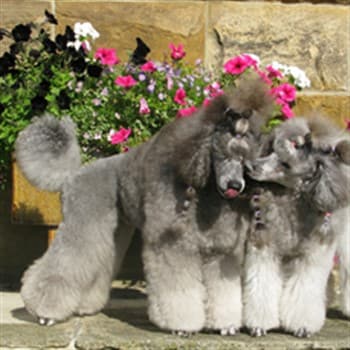
Recommended Topical Products to Heal Dry Skin
Sprays
– A topical spray that targets specific areas can be a good choice. If dry skin is the only sign (no swelling or pain), an all-natural spray that contains soothing and moisturizing ingredients can work well. We recommend Vet’s Best Hot Spot spray (see below). It contains tea tree oil, aloe vera, and chamomile.
Lotions
– A lotion is great for dry skin; a good one will have maximum absorption to quickly heal and treat. There’s a really fantastic one made by ReQ Organics that works on a wide range of issues including: Dryness (body, paws, and/or nose), hot spots, mange, and/or itchy skin, and even can promote hair growth in areas where the coat was thinning. It contains aloe vera, Manuka honey, coconut, olive oil, hemp seed oil, shea butter, and vitamins (A, B, C, and E).
Shampoos
- If your Poodle’s entire body is dry and itchy, you’ll want a thick, super-moisturizing shampoo that you can lather on, and leave on for at least 10 minutes.
One of our favorites is by Moosh; it’s quite incredible and can heal a wide range of issues including dryness, itchiness, scaling, fungal infections, bacterial infections, flaking, dandruff, sore skin due to flea bites, and irritations due to allergies. It does this by having an impressive blend of 100% organic ingredients. Bentonite clay binds to toxins in the skin, and gently yet effectively pulls them out. Argan oil and neem oil are super moisturizing. Shea butter soothes, and aloe vera helps skin heal.
Leave-ins
– While shampoos are great to envelope your dog in a soothing treatment, for severe dry skin issues, you’ll also want something that can help 24/7. And this is where certain leave-ins can be very beneficial.
Warren London makes a hydrating butter that immediately soothes, and then releases its natural emollients every 2 hours, for non-stop moisturizing. It has two main ingredients. Guava; this has natural anti-allergic properties and works by blocking histamines. In turn, it reduces irritation and itching. The other is mangosteen (a tropical fruit), which fixes dry skin via its ability to repair skin cells. This is a non-oily, soothing butter, and as an added bonus, it smells fantastic.
Recommended Supplements to Heal Dry Skin
While a supplement alone may not completely restore dry skin, and steps should be taken to eliminate triggers and offer immediate relief, offering an omega supplement can be part of an overall plan to prevent drying.
Top-quality kibble
will have good levels of omega in it, but if there are issues happening, extra omega can help.
Specifically, this refers to Omega 3 fatty acid. This is an essential acid, meaning that the body cannot synthesize this, it must come from the diet.
There are several sources of omega, including flaxseed and fish, and to a lesser degree some vegetables and eggs. For dry skin, wild fish oil may be the best option, since flaxseed contains a different type that helps to a much lesser degree. In addition, farmed fish often contains up to 15% vegetable oil which lowers the overall content of fish oil.
You may find that offering a liquid form works well, since this can be applied directly to a dog’s food. A good one to try is Grizzly Wild Salmon Oil ; this is 100% pure wild Alaskan fish oil, is made in the USA, and comes in a handy pump. Do be sure to mix this in well, or your Poodle may just eat the pieces with the fish oil (most dogs love the smell and the taste).
; this is 100% pure wild Alaskan fish oil, is made in the USA, and comes in a handy pump. Do be sure to mix this in well, or your Poodle may just eat the pieces with the fish oil (most dogs love the smell and the taste).
A Final Word
Dry skin is rather common with Poodles. It’s best to take steps to prevent this in the first place. If it does occur, it’s best to catch this in its early stages, so do be sure to inspect your Poodle for signs of drying.
If your Poodle is suffering from dry skin, take all applicable steps to quickly nip this in the bud and offer relief. But, do not hesitate to bring your Poodle to the vet if there are other troubling symptoms or if at-home remedies are not enough to resolve the issue.
You May Also Like:
Poodle Care Tips
- A round-up of all the aspects that should come together to offer optimal care, comfort and safety for Poodles of all ages.
Poodle Separation Anxiety
- If your Poodle struggles with being home alone, these tips can make a big difference. There are some effective methods to help a dog feel confident and safe.
The Best Type of Toys for Poodles
- For keeping a Poodle busy to helping with teething, all the top toys that can help make life easier for both your Poodle and you.

